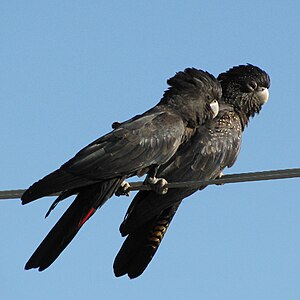Red-tailed black cockatoo
| Red-tailed black cockatoo | |
|---|---|
 |
|
| A pair (male on left and female on right) | |
| Scientific classification | |
| Kingdom: | Animalia |
| Phylum: | Chordata |
| Class: | Aves |
| Order: | Psittaciformes |
| Superfamily: | Cacatuoidea |
| Family: | Cacatuidae |
| Subfamily: | Calyptorhynchinae |
| Genus: | Calyptorhynchus |
| Subgenus: | Calyptorhynchus |
| Species: | C. banksii |
| Binomial name | |
|
Calyptorhynchus banksii (Latham, 1790) |
|
| Subspecies | |
|
|
 |
|
| Red-tailed black cockatoo range (in red) | |
The red-tailed black cockatoo (Calyptorhynchus banksii) also known as Banksian- or Banks' black cockatoo, is a large black cockatoo native to Australia. Adult males have a characteristic pair of bright red panels on the tail that gives the species its name. It is more common in the drier parts of the continent. Five subspecies are recognised, differing most significantly in beak size. Although the more northerly subspecies are widespread, the two southern subspecies, the forest red-tailed black cockatoo and the south-eastern red-tailed black cockatoo are under threat.
The species is usually found in eucalyptus woodlands, or along water courses. In the more northerly parts of the country, these cockatoos are commonly seen in large flocks. They are seed eaters and cavity nesters, and as such depend on trees with fairly large diameters, generally Eucalyptus. Populations in southeastern Australia are threatened by deforestation and other habitat alterations. Of the black cockatoos, the red-tailed is the most adaptable to aviculture, although black cockatoos are much rarer and much more expensive in aviculture outside Australia.
The species complex was first described by the ornithologist John Latham in 1790 as Psittacus banksii, commemorating English botanist Sir Joseph Banks. The red-tailed black cockatoo also has the distinction of being the first bird from Eastern Australia illustrated by a European, as a female, presumably collected at Endeavour River in north Queensland, was sketched by Banks' draughtsman Sydney Parkinson in 1770. Narrowly predating Latham, English naturalist George Shaw described Psittacus magnificus from a specimen collected somewhere in the Port Jackson (now Sydney) region. For many years, the species was referred to as Calyptorhynchus magnificus, proposed by Gregory Mathews in 1927 as Shaw's name had predated Latham's 1790 description. For several decades, Mathews' proposal was accepted by many authorities, although it was unclear whether the original Port Jackson reference had actually referred to the red-tailed black or, more likely, the glossy black cockatoo. In 1994, an application to conserve Calyptorhynchus banksii as the scientific name was accepted by the ICZN. The red-tailed black cockatoo is the type species of the genus Calyptorhynchus, the name of which is derived from the Greek calypto-/καλυπτο- "hidden" and rhynchus/ρυγχος "beak". The change was first made by Anselme Gaëtan Desmarest in 1826.
...
Wikipedia

